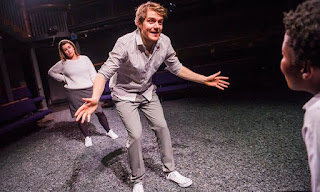'The Brink' review or 'What state is your stasis in?'
'The Brink', Brad Birch
Orange Tree Theatre, 13th April 2016
In all impressive plays (and
‘The Brink’ is most certainly that) there will always be a moment which seems
to have the whole play bound up in it. This moment will all-but glow with
meaning and make the audience tingle. In Brad Birch’s ‘The Brink’, this moment
comes near the end of his play when teacher Nick - driven doolally by visions
of a bomb beneath his school – digs desperately for answers. He scrabbles and
scratches away at the ground, his body tight with tension, only to find a great
hole filled with paper. The hole glows brightly, but it glows with a light that
is cold and taunting. It is a chilling moment which feels utterly contemporary
and oddly familiar; a glimpse at the fraught search for identity and purpose
that so many of us (particularly, perhaps, young men) seem to be undergoing
today, which is underpinned – inevitably and horribly – by a buzzing sense of
panic, depression, and powerlessness.
Now, all that might sound very
gloomy indeed - but ‘The Brink’ is actually a very funny play, which refuses to
take itself too seriously. About half way through, when poor Nick (played with a brilliant light touch by Ciarán Owens) is seriously
starting to lose his shit, one of the characters pipes up: ‘What is this, Angela’s
Ashes?!’ You see, that is the thing with depression and fear these days; it
isn’t an exceptional thing, it doesn’t warrant special treatment and – no
matter how overwhelming it might become – it is still, until the very moment it
becomes unmanageable, an ordinary aspect of everyday life.
It’s the very normality of
Nick’s abnormal feelings that lends ‘The Brink’ such a strange power. Nick’s
fears became his ‘new normal’ and it is only very late on – once it is far too
late to row back - that Nick’s visions swerve wildly out of control. Director
Mel Hillyard (who has worked with Birch previously) ratchets up the oddness at a
controlled and subtle pace. At first, the production contains just the softest
of strange glimmers (and a lot of easy chuckles). But slowly, slowly those odd
flashes begin to build – lights flash red, characters slide into one another, night
merges with day, jokes turn sour – and Nick’s nightmares become a reality.
Designer Hyemi Shin keeps the stage space fairly clear and clutter-free. The floor is filled with the wooden chips you find in a school playground, but is otherwise empty. The only props are four square stools, which glow white and – in later and more intense moments – a cool harsh red. The stage looks like a blank space, an empty playground, a gloomy dreamscape; the inner-workings of Nick’s tired and fearful mind. It is the ideal setting – open-ended yet with a childish twang - in which to explore the ‘stasis’ that is slowly consuming Nick. It is a space that suggests the yawning nothingness that is depression. It is also a space that hints at the way in which endless options and a refusal to grow up (exacerbated by an inability to buy houses, afford children etc) is trapping today’s young adults in a limitless childhood.
As Nick’s depression and
paranoia take hold, he turns away from the adults around him (including
girlfriend Chloe) and confides, instead, in a young student. A deep distrust of
authority runs like molten lead through Birch’s play. Chloe’s bastard boss
Martin and creepy headmaster Mr Boyd are played with chilling and cheerful indifference
by Vince Leigh. He is the authority figure that today’s younger generation have
begun to despise, or at least deeply distrust. He is the government that is
planting a bomb – in broad daylight - under our children’s schools and futures.
Nick begins to see his enemy –
headmaster Mr Boyd – in everyone around him. Vince Leigh plays all the preening
figures in Nick’s life; he is there behind swaggering boss Martin, self-serving
headmaster Mr Boyd, and all the ballsy students who seem far more certain of
themselves than Nick will ever be. The doubling is used most frequently, and
most meaningfully, with the male characters in Nick’s life; they taunt him
with versions of manliness that he fears he will never match. This same fear –
what does it mean to be a man today – runs through countless contemporary
plays, written by men. It’s there in every Alistair McDowall plays (all his
male characters are, in part, running away from themselves); it’s there in Nick
Payne’s wrangling with ideas of fate and identity ('Constellations' and 'Incognito'), Duncan Macmillan’s search for the meaning of happiness ('Lungs' and 'Every Brilliant Thing') and the
constant questions about male identity that run through Mike Bartlett’s
writing.
And so we return - again - to that closing
image, in which Nick digs and digs – desperate to find something deep and real
and dangerously alive – but is confronted, instead, with a gaping hole filled
with paper. It’s an image that resounds with a horrible sort of hollowness; a
space filled with bureaucracy and paperwork when what we really want is bombs,
rushing blood and meaning. No bomb, then – and yet the clock keeps ticking.



Comments
Post a Comment